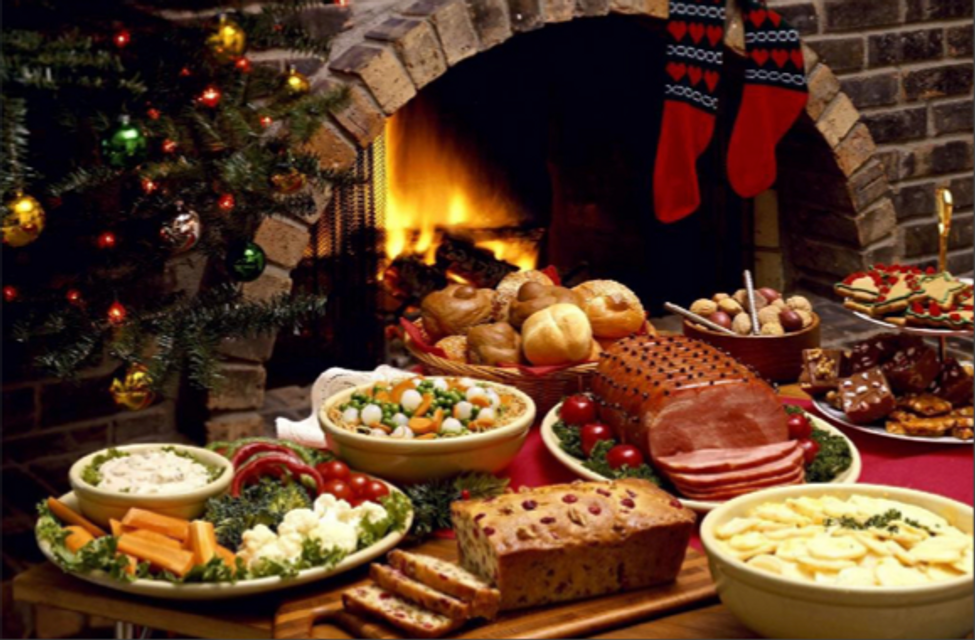Jan 23rd 2024
13 Ways to Outsmart the Holidays
Have you ever won a stare-down with a tray of Christmas cookies?
 You’ve probably heard that people gain an average of five to ten pounds between Thanksgiving and New Years. The good news is that the real average is more like one to two pounds. The bad news is that most of that weight is never lost. And people who are already overweight tend to gain pounds faster than normal-weight individuals do.
Whether you are following the Beyond Health lifestyle to lose weight, or to get well and stay well, the next few months may challenge your resolve like no other time of year. The holiday season—for many now stretching from Halloween to the Superbowl—is a marathon of festive celebrations with friends and family that attempt to bring cheer to what might otherwise be a cold and gloomy time of year.
You’ve probably heard that people gain an average of five to ten pounds between Thanksgiving and New Years. The good news is that the real average is more like one to two pounds. The bad news is that most of that weight is never lost. And people who are already overweight tend to gain pounds faster than normal-weight individuals do.
Whether you are following the Beyond Health lifestyle to lose weight, or to get well and stay well, the next few months may challenge your resolve like no other time of year. The holiday season—for many now stretching from Halloween to the Superbowl—is a marathon of festive celebrations with friends and family that attempt to bring cheer to what might otherwise be a cold and gloomy time of year.
 You’ve probably heard that people gain an average of five to ten pounds between Thanksgiving and New Years. The good news is that the real average is more like one to two pounds. The bad news is that most of that weight is never lost. And people who are already overweight tend to gain pounds faster than normal-weight individuals do.
Whether you are following the Beyond Health lifestyle to lose weight, or to get well and stay well, the next few months may challenge your resolve like no other time of year. The holiday season—for many now stretching from Halloween to the Superbowl—is a marathon of festive celebrations with friends and family that attempt to bring cheer to what might otherwise be a cold and gloomy time of year.
You’ve probably heard that people gain an average of five to ten pounds between Thanksgiving and New Years. The good news is that the real average is more like one to two pounds. The bad news is that most of that weight is never lost. And people who are already overweight tend to gain pounds faster than normal-weight individuals do.
Whether you are following the Beyond Health lifestyle to lose weight, or to get well and stay well, the next few months may challenge your resolve like no other time of year. The holiday season—for many now stretching from Halloween to the Superbowl—is a marathon of festive celebrations with friends and family that attempt to bring cheer to what might otherwise be a cold and gloomy time of year.
The Challenge of Cheer
It’s always harder to maintain your diet when you leave your house, but during the holidays, there is a whole lot of leaving the house. And the tendency to think of food as entertainment instead of nourishment is never more pronounced than during the holidays. When you add up all the festive punches, eggnogs, and cocktails; the pies, cakes, cookies, and bottomless bowls of candy; and the mashed potatoes and gravy, stuffing, cornbread, and dinner rolls, you’re facing a massive onslaught of calories with very little nutrition to back it up. At the same time, there’s a really good chance that whatever exercise routine you’ve finally gotten going will be relegated to oblivion.
The holidays also tend to bring emotional trials. Perhaps because it is supposed to be such a happy time, those not-so-happy moments that strike most of us seem to hit harder. Juggling the holiday party schedule, competing with the hoards of shoppers for parking, and enduring Uncle Harold’s annual tirade one more time, all take their cumulative toll. If your relationships with your mate, your friends, and your family are not quite as heartwarming as the classic holiday images suggest they should be, the happiness gap can be downright depressing. And that can lead to compensatory eating and drinking.
So, what can you do to find a balance between maintaining healthy choices and sharing in the holiday festivities? Here are some suggestions.
Prepare Yourself Mentally
Everything you experience happens primarily in your mind. Sure, there’s an objective reality out there, but that’s not what really holds sway over you. It’s the story you tell yourself about what’s happening that has the most impact. So let’s get our story straight.
1. Be realistic. If you’ve been trying to lose weight, shift your goal during the holidays to maintaining your weight. If you manage to make it to January without gaining a few pounds, consider it a victory to be proud of. Make a commitment not to beat yourself up just because you didn’t get any lighter during these months.
2. Be assertive. Recognize that it’s perfectly acceptable to pass on something that’s being offered to you. Plan to do so without drawing much attention to yourself. No excuse or explanation is necessary.
3. Focus on people, not food. Remember that the real purpose of all these get-togethers is to enjoy each other’s company, not to outdo each other in a sort of gastronomic triathlon.
4. Look for the good. Instead of dreading a rerun of last year’s run-in with Aunt Gertrude, think of how you can defuse the situation by drawing out her good qualities. Or, try to realize that she must be unhappy and genuinely wish that it could be better for her. This compassionate outlook will dissolve your need to be right.
5. Check your righteousness. You may be quite focused on your health and the dietary and lifestyle choices you believe will get you there. But not everyone shares your passion about this—particularly during the holidays. So don’t even try to convert anyone to your way of thinking.
6. Be an example. On the other hand, if you have been losing weight or getting healthier, and people can see that, you don’t have to go underground about it. Don’t be shy about making your morning smoothie, having a big salad, or drinking water. Let your actions speak for themselves.
Control What You Can
It’s so much easier to follow your principles in the predictable environment of your own home. When you’re going to someone else’s home, or to a restaurant, you’ll have to make some compromises. Accepting that going in will make it easier on everyone.
7. Take your supplements. Supplements are like a nutritional insurance policy, so they are even more important when your diet is not going to be maintained. Don’t compromise on this. Put each meal’s pills in a pillbox or baggie and make a commitment to take them at your regular times. Don’t be embarrassed about being seen taking pills! If anyone says anything, just explain you’d rather take vitamins now to stay healthy rather than take medicines later after you get sick.
8. Bring healthy snacks with you. This is a smart hedge against the temptation to put your hand in the cookie jar or grab a piece of candy. Raw mixed nuts travel well and are high in good fats and protein, providing satiety and reducing cravings. Add some dried cranberries, chopped dates, bits of candied ginger, or dark chocolate, and you won’t feel deprived at all. Eating a handful of nuts before a meal out will help compensate for any reduced intake due to the limited choices available to you.
9. Try to avoid sugar, wheat, and dairy. Yes, that’s about 80% of what’s out there, so you may have to make some exceptions. But at least change the proportions. Survey the buffet table before you take your plate. If there are vegetables and salads, make those your largest servings. Unless you’re a strict vegetarian or vegan, consider having a small serving of meat, even if it’s not organic. You’ll get more mileage out of that protein than all the empty carbs. Definitely, skip the bread, and try to pass on the cheese and the sweets.
10. Consider a three-bite maximum. A little bit of almost anything won’t hurt that much. So, whether it’s a decadent dessert, a rich gravy, or a bodacious beverage, having just enough to experience the taste without getting that sinking feeling that you’ll pay for it later is a great way to go. If you’re going to have something that’s way off your approved list, have the smallest portion that you feel you can get away with.
11. Make water your friend. With the endless availability of sugary drinks, diet sodas, and alcohol, forgetting about water altogether is a real possibility. Don’t fall into that trap! Your body is going to need that water to detoxify. Drinking water can also reduce hunger pangs, and alternating water and alcoholic beverages can cut your cut your alcohol consumption in half.
Schedule Some “Me” Time
If you’re going “home for the holidays” for several days or more (or if everyone is coming to you), keep in mind that your body’s needs don’t take a vacation just because you do. It still needs plenty of movement, rest, fresh air, and sunshine. When families get together, there’s no law that says everyone has to stay together in a blob from morning coffee to lights out.
12. Keep moving. If you have a daily exercise routine, see if you can find ways to maintain it or do something equivalent. Does your gym membership give you access in other cities? Are there Zumba classes in the area? If yoga’s your thing, see what postures you can do without your mat (or bring it). Can you borrow someone’s bike? At the very least, you can take a brisk 30-60 minute daily walk around the neighborhood. Make it a tradition and enroll others to join you.
13. Get enough sleep. The excitement of seeing everyone again after a long absence and getting caught up on all their stories requires extended periods of paying attention, and that can take a lot out of you. Add the overindulgence in food and drink (or the extra effort expended to avoid it) and your need for rest is even greater than usual. Try turning in early one or more nights, or if that’s not possible, see if you can take a nap during the day. An eye mask and earplugs might be just the ticket!
Navigating the holiday season can feel like walking through a minefield of taste temptations and emotional stress. With a shift in perspective, some extra awareness and preparation, and a happy heart, you can achieve at least a maintenance level of your healthy habits and still fully enjoy this special time of year.
 Fuel your life with the purest vitamins
Fuel your life with the purest vitamins
